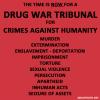05/18/22 James Gierach
James Gierach, a former Chicago prosecutor was for years the executive board vice chairman of Law Enforcement Against Prohibition (LEAP) an international organization of former law enforcement and criminal justice officials who speak out against the failures of existing drug policies throughout the world. LEAP is now: Law Enforcement Action Partnership. Gierach has for decades been attending annual meetings of the United Nations Commission on Narcotic Drugs in Geneva, New York and elsewhere.



